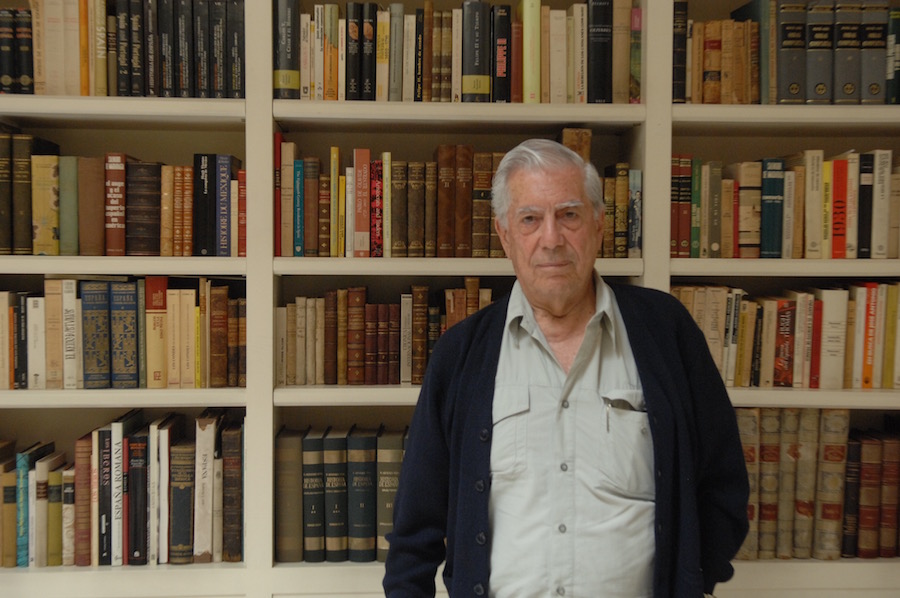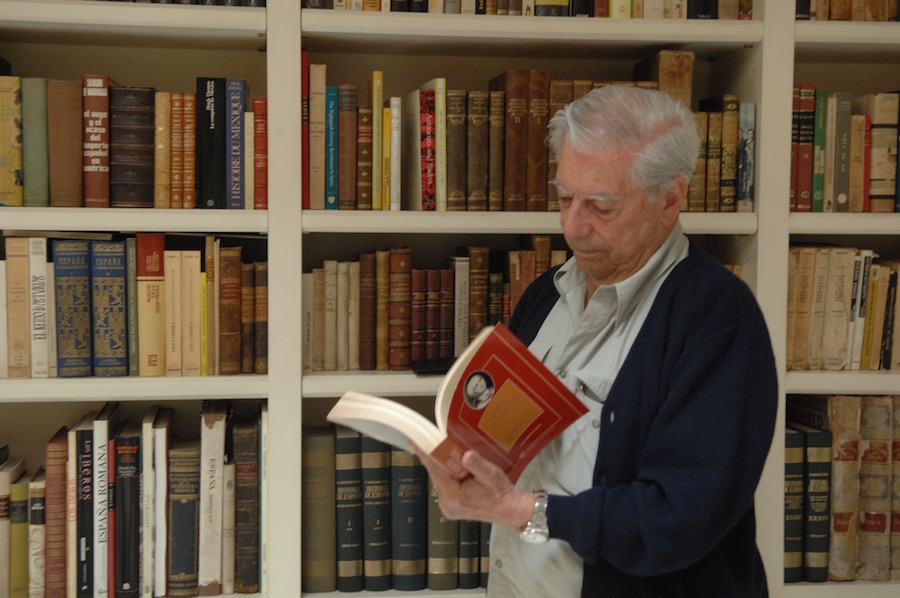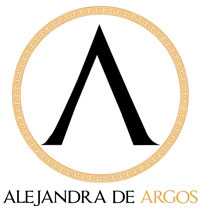On the occasion of the Madrid Book Fair, Mario Vargas Llosa talks about his latest publication, "The Call of the Tribe", an intellectual and political essay on the philosophers and authors who have shaped his thinking. Which book from current Spanish literature would you most highly recommend? Out of all I've read lately, perhaps the most interesting would be Javier Cercados' "The Impostor".
Autor: Elena Cué

Mario Vargas Llosa. Photo by Elena Cué
On the occasion of the Madrid Book Fair, Mario Vargas Llosa talks about his latest publication, "The Call of the Tribe", an intellectual and political essay on the philosophers and authors who have shaped his thinking.
Which book from current Spanish literature would you most highly recommend?
Out of all I've read lately, perhaps the most interesting would be Javier Cercados' "The Impostor". It's a wonderful book in that it is both a report that reads like a novel, whilst at the same time having as protagonist a character one would find hard to believe was real. It's a very entertaining and fun read.
In your latest book, "The Call of the Tribe", you present a staunch defence of liberal doctrine. With regards to the media today, how does one reconcile freedom of expression with fake news?
I think that is one of the biggest problems of our time. We're seeing a real revolution in the field of communications but this, instead of spreading the truth about what is happening in the world, has allowed fiction to infiltrate the media making it now very difficult to know what is true and what is seemingly true, but false. These are the famous post-truths of our time.
Elon Musk said recently that he wants to create a service - something like a qualification agency - in order for readers to be able to ascertain the journalistic rigour of any writer or media outlet. How would you feel about that?
I wish there were a reliable, valid way to reference and rate the media in terms of their truthfulness or falsehoods. As human beings, we are totally confused as regards the media today. They're pulling the wool over our eyes with the greatest of ease. Nevertheless, what's even worse is that there are nation-states with technology whose sole purpose is the dissemination of lies masquerading as truths. And this conspires tremendously against the very existence of democratic societies. Democracy is based on truth prevailing over lies so, if the boundary between these two becomes increasingly obscured and vague, it is democratic society itself that is threatened by this exaltation of those infamous post-truths.
So we are being played.
Freedom would disappear and people - come voting time - would often be basing their choices on facts that are completely false, exaggerated, distorted or, quite simply, blatant lies.
In your book, you talk about how you were an enthusiastic proponent of Marxism in your youth, but that you ended up distancing yourself from that ideology after witnessing, during visits to Cuba and the Soviet Union, how those ideas actually pan out materially. Do you believe that Liberalism helps more than Marxism to improve the lot of society's lower echelons?
Absolutely. One only thas to look at countries whose politics have been most effective in combating or eradicating misery and poverty, those who have created the best living conditions for all of its citizens. There isn't a single Marxist country among them. The countries that have attained the highest standards of living are democratic ones that apply liberal-style policies, as is the case with the Nordics, for instance, or Switzerland, etc. In Asia, the most developed countries are already democracies or ones that have been leaving authoritarianism behind and increasingly approaching what are now liberal and democratic societies.
Marxist countries, on the other hand, have been disintegrating and disappearing one after another and not because of any external intervention but because of the absolute inability of their institutions to meet the most basic needs, desires and illusions of any society.
Why did the Soviet Union fall?
The Soviet Union fell not because it was attacked. It collapsed because of its own inability to create a modern, efficient society offering full employment and an acceptable standard of living.
Why did Communist China suddenly become a Capitalist country?
That also happened because of China's collective and state inability to create employment and acceptable living conditions for all of its citizens. I think this is the most conclusive and definitive proof that Socialism, of the Communist variety, doesn't work.
Adam Smith, Popper, Hayek, Ortega y Gasset, Raymond Aron, Isaiah Berlin and Revel are the seven liberal thinkers who feature in your book. Is there something they all have in common?
Their tolerant attitude, their admission that, rather than being invariably self-evident and obvious, the truth is often vague and obscure and that, therefore, many mistakes can be made. Also, that what must always be fought against in the field of politics is dogmatism or the authoritarian imposition of specific principles or particular methods. In this field, I believe Liberalism has always been a doctrine of absolute tolerance and this tolerance is its best defence against violence.
Does Hayek's Neoliberalism have anything to do with the modern, more radical version?
Hayek has been on the receiving end of much criticism for having, shall we say, such an unshakeable faith that the free market would solve practically every problem and he is attacked as an extremist for it. There is some truth to that. He would often exaggerate his beliefs and even held some that I found to be absolutely false, such as that there was more liberty in Chile under Pinochet than under Allende. I think that was an outrageous comment for which he was roundly and rightly criticised. To think that a dictatorship that kills people or enforces press censorship can be more free than a democratic society, albeit an extremist one like Allende's, seems patently wrong to me.
Where would Liberalism fit in?
There are tendencies at the moment that come very close to Liberalism. Social Democracy, for instance, often verges on it. But then there are aspects of Conservatism that also border on it. Actually, I quote the case of Thatcher and Reagan who were both conservative leaders but who nevertheless made unreservedly and deeply liberal economic reforms which brought numerous benefits to their respective countries. So I think Liberalism is made up of many different nuances, all of them with laws and reforms that are open to criticism, fostering the potential improvements and systematic refinements that Popper called permanent reformism. Ultimately, this is the doctrine that has allowed countries to achieve the best methods for economic and social development, as well as democratic tolerance.
Do you agree with Hayek that intellectuals are the enemies of liberty because they are so detached from industry and commerce?
Unfortunately, twentieth-century intellectuals have demonstrated an extraordinary level of political blindness. First and foremost for not seeing how reality was so far removed from the grand illusions of Marxist socialism and, lastly, because they have contributed more than anyone else to devaluing democratic principles and presenting democracy as the mask of exploitation and colonialism, etc, something that democracy has never been. That is precisely why the attempt at attaining paradise, as proposed by Marxism, led, ultimately, to the creation of sheer hell on earth. By contrast, democracy doesn't aspire to build a heaven on earth but rather it hopes to create a system with the potential for near-perfection via periodic reforms to improve progress towards combating major issues like unemployment and health with ever greater efficiency. And this is a reality that is borne out by facts because the most advanced, least imperfect societies are democratic or, in other words, liberal ones. It's true that democracy isn't perfect. There's been corruption at its heart, without a doubt, and that's the reality. But the most imperfect democracies are still preferable to the most perfect dictatorships, always.
In a world where wealth production has become the principal value, what do you think is the function of the intellectual today? Should intellectuals play an active part in society and politics?
I think participation is a basic democratic principle. If you don't take part in public debate then you have no right to complain, not even if you're only doing it in writing. There's nothing that destroys language as much as politics does because politics is about soundbites, set phrases, sayings that don't express truth or reality. In this area, intellectuals have a really important role to play. Also, on another level, I think a society without ideas is one that is condemned to die.
Where should these ideas come from?
Ideas come out of culture which is the great source, the supplier. So, in that sense, intellectuals should be like the seven thinkers in my book who have contributed, in such a decisive way, to the refinement of democratic doctrine and its institutions. Although, having said that, the ideal would be for intellectuals to differentiate between fact and fiction. There is a reality that can be perfect and that is the reality we create through painting, poetry, literature, etc. In that sphere, yes, perfection is achievable. Where it is not achievable is in the realm of politics or society. It's impossible for the whole of society to share the exact same values or to agree on what defines beauty or true pleasure or what the greatest achievements are. These things vary enormously depending on the idiosyncracies and personality of each individual. In this sphere, what's fundamental is that there should be great freedom for every individual to organise their life according to their own values and without compromising, damaging or erasing those of others.
In that respect, intellectuals shoulder great responsibility?
I believe so, yes. Take Sartre, for example. I was an avid reader and follower of his yet he ended up defending the Chinese Cultural Revolution which resulted in twenty million dead. On the other hand, the one thing I found compelling about Sartre was his stance on anti-colonialism. But then he went on to defend the Soviet Union and the Chinese Cultural Revolution which was one of the worst atrocities imaginable.
In your book, you don't just talk about Sartre ...
No, not only Sartre. How many other illustrious French intellectuals, like Roland Barthes, went to China? What was a sublime purist like him doing defending the killings and the horrific violence? The whole Tel Quel group went to China to pay homage to Mao and his Little Red Book. There's a contradiction there that's difficult for us to understand but I think it's that they were under the illusion that Communism would guarantee this perfect society and it would be like a great work of art, a masterpiece, a symphony. And, in the end, what did Communism do? It created hell on earth.
What do you think of the economic measures taken by Trump as regards bank deregulation, tax cuts and increased trade tariffs?
To a liberal, any decrease in taxation seems like a good move. But Trump's policies are completely contradictory because, on the one hand, they might well seem liberal but, on the other, they couldn't be further from liberalism, as in the case of border control and immigration. If you notice, this is very much at odds with the great American tradition of open borders. The USA is a nation of immigrants, a country whose grandeur arose from having opened its arms to the whole world and welcomed immigrants from practically every culture on earth and, thanks to what Americans call the "melting pot", integrating them into a society that really was the driving force for progress. I think Trump's policies go against that great, American, liberal tradition.
Moreover, it's really difficult to find either political - nationally and internationally - or economic coherence because of this constant contradiction. It's systematic confusion. For example, I think his anti-immigration policy is in direct conflict with every single liberal, democratic principal there is. Separating children from their parents is cruel, it's inhumane and it's in direct opposition to the spirit of democracy.
I would never have imagined that America, a seemingly advanced society, could choose a character like Trump, who is basically a populist. He's an unpredictable person.

Mario Vargas Llosa. Photo by Elena Cué
Three of the seven thinkers who appear in your book are Jewish and of those, Isaiah Berlin is in favour of Zionism and Popper is against. With regards to the current Israeli-Palestinian conflict, what are your thoughts?
What seemed to be the best solution was the two-state one. That had UN endorsement and there was a practically universal consensus that such a partition of the territory between Palestine and Israel should take place. At least half of the Israeli population agreed and there was this extraordinary movement called "Peace Now".
However, I think the critical moment was when Israel agreed to return 95% of the occupied territories and to accept Jerusalem as the capital of both Israel and Palestine. That Arafat rejected the offer was, I think, a very serious error of judgement.
Why?
Because since then, Israeli society has come to the conclusion - as hammered home by Sharon - that it isn't possible to reach an agreement with the Palestinians. This has made Israeli society increasingly reactionary and conservative while the pacifist movement shrinks day by day. In this sense, the tradition initiated by Sharon has been further radicalised by Netanyahu.
It's a situation that benefits no-one.
Absolutely. This state of affairs suits neither Palestine nor, to an even lesser extent, Israel. Israel is a country living in permanent danger, with constant military mobilisation and surrounded by enemies. It's also a country that's become very hardened, very violent and very militarised so it's become really difficult to defend Israel today after so many massacres. Granted, the country is very strong but you can't live in conditions like that. You can't live by requiring young people to do three years of military service. What kind of life is that
Reciprocal intolerance increases on a daily basis because, of course, on the Palestinian side the most radicalised forces are the prevalent ones. There's no solution in sight but what is clear is that this situation cannot continue indefinitely.
How would you rate Macron's first year as President of the French Republic?
I have a lot of time for Macron. I think he has liberated France from the clutches of fascist, extreme right factions such as the Front National and he has given French democracy back the youthfulness, idealism and dynamism it had lost. And not just French but European unity as a whole because he ran a campaign that benefited not only France but the European Union, also, which has since undergone an extraordinary revitalisation thanks to him. What's more, he's managed to bring people, who were otherwise absolutely estranged and fed up, back to politics. That's added a breadth and generosity to his politics. In a way, Macron has been the salvation of France at the time of crisis it found itself in, without a doubt.
In your book, you talk about "spontaneous orders", meaning those not personally determined by an individual but the ones that emerge spontaneously over time like, for instance, language, private property, commerce, markets. What would you say were the spontaneous orders of today?
Hayek believed in something quite fantastical - that the institutions which really prevail are not the ones created from power but the ones we carry along with us from the past. In other words, the ones that have survived the passage of time and new experiences, the ones that have demonstrated their ability to transform themselves over time and with time and tradition. These "spontaneous orders" are the best guarantee of prosperity a society can have. I think Hayek was totally spot-on about this.
Could women's rights, such as they are now, be among them?
Without a shadow of a doubt. Right now, we're seeing how this movement has gained traction and I think it's going to be a compelling one that will ultimately prevail on all levels, everywhere. Why? Because it's a matter of essential justice. Women, for the mere fact of being women, have been conditioned throughout history to be discriminated against, to be marginalised, and the time has come in humankind's evolution for this to no longer be tolerated. And it's not just intolerable for women. It's intolerable for any person with even a modicum of culture and sensitivity. This recent mobilisation towards gender equality is a magnificent example of a spontaneous order.
We complain about dumbed-down culture yet, at this moment in time, museums are full, tourism is massive, millions of books are published every year ... Is that another spontaneous order of our day?
I'm not so optimistic as far as culture goes. Yes, it's become more widespread but it has also become more frivolous and trivialised. The ideal would be for it to spread, but without the frivolisation, because if there isn't a certain hierarchy, if values are confused, if there's no longer any excellence or mediocrity and ineptitude in the field of culture ... That's not to say that the elite should disappear, nepotism aside, but in the cultural field there are certain vocations that demand a certain discrimination. And this is what determines the standards of cultural excellence. That discrimination would be the effort, discipline and talent, basically, that mean certain people, certain individuals reach greater heights than others. We cannot stop acknowledging this, because if we go by the lowest common denominator then, ultimately, it's culture itself that will collapse.
(Translated from the Spanish by Shauna Devlin)
- Interview with Mario Vargas Llosa, Nobel Laureate - - Alejandra de Argos -




